Zephyr Extra:
NOTE: This is a followup to a story that appeared in the Aug/Sept issue of The Zephyr. Read that story here.
While Grand County has had more than its share of polarizing political fights over the years, none has been as personal or as vitriolic as this one. Though most participants in the Negro Bill controversy, from either side, have kept their opinions civil and fact-based, attempts to wage a candid but respectful discussion have often been sidetracked by the “bombast and invective” hurled from both sides of the political spectrum.
On the one hand, there still exists a relative handful of closet racists out there who have felt re-energized by the debate. They cling, wrongly, to the idea that those who support the name “Negro Bill” in its historical context are, in fact, as dyed-in-the-wool bigots as they are. It’s been liberating for these misguided few and they’ve been emboldened to start writing the ‘N-word” itself, especially on social media—as if finally, the people are moving to their side. They’ll find no allies here.
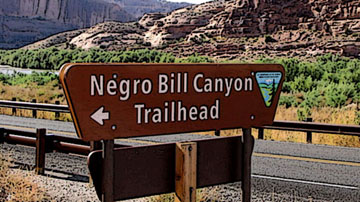 The heart of this argument is not whether the word “negro” should be used in daily conversation to describe African-Americans. Nobody is remotely suggesting that. The question is, or should be, is it proper to use the term, Negro,’ in its historical context? For example my wife and I visited the “Negro Leagues Baseball Museum” in Kansas City last month. It was created in 1990 by a black man named Horace Peterson. He founded the ‘Black Archives of Mid-America’ to document the history of African-Americans in the Mid-West. Starting a new organization, he used the term ‘black.’ Of course. But when they subsequently started the museum and moved to its permanent location in 1997, they retained the “Negro Leagues” name because that’s what it was called when it functioned as a viable business for 50 years.
The heart of this argument is not whether the word “negro” should be used in daily conversation to describe African-Americans. Nobody is remotely suggesting that. The question is, or should be, is it proper to use the term, Negro,’ in its historical context? For example my wife and I visited the “Negro Leagues Baseball Museum” in Kansas City last month. It was created in 1990 by a black man named Horace Peterson. He founded the ‘Black Archives of Mid-America’ to document the history of African-Americans in the Mid-West. Starting a new organization, he used the term ‘black.’ Of course. But when they subsequently started the museum and moved to its permanent location in 1997, they retained the “Negro Leagues” name because that’s what it was called when it functioned as a viable business for 50 years.And here’s the real irony. What makes this debate so unique, of course, is the fact that the push to change
the name comes predominantly from middle class white people. Among the most ardent defenders of the word “Negro” in its historical context is Jeanetta Williams, President of the Salt Lake City Chapter of the NAACP. For several years, she has repeatedly expressed her support for leaving the canyon’s name as it is. She told the Associated Press, “We don’t want to lose the history.”
On July 21, Williams posted on her facebook page, “Renaming Negro Bill Canyon is back in the news using excuses to change the name. The NAACP wants to leave the name as it is to preserve history. Julian Bond, NAACP National Attorneys, Dr. Ronald Coleman, U of U History Professor and others support our efforts on keeping the name as it is. The Grand County Council will meet…to further discuss this issue. The (UNCF) United Negro College Fund remains that and has no intentions of changing their name.”
Williams asked her followers, “Anyone wishing to show support of the NAACP in retaining the name “Negro Bill Canyon” can email today to: council@grandcountyutah.net or call their council administrator at (435) 259-1347 immediately. Thank you in advance.”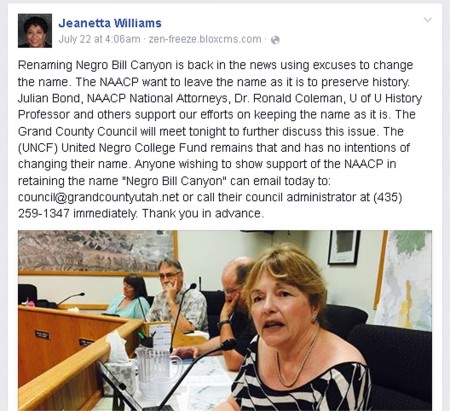 You’d think it would be difficult to reject her opinion. No one has stronger civil rights credentials in the Rocky Mountain West than Jeanetta Williams. She has given her life to activism and to civil rights issues and has been recognized time and again for her efforts.
You’d think it would be difficult to reject her opinion. No one has stronger civil rights credentials in the Rocky Mountain West than Jeanetta Williams. She has given her life to activism and to civil rights issues and has been recognized time and again for her efforts.
Jeanetta Williams was elected to the national board of directors of the NAACP and served there for six years. In 2000, she was instrumental in changing the name of Utah’s ‘Human Rights Day’ to ‘Dr. Martin Luther King Jr. Day.’ In 1997,Williams received the Utah Women’s Achievement Award from the Governor’s Commission for Women and Families. In 2001, the University of Utah named her one of the state’s 25 outstanding women activists. She was the 2006 NAACP/SLC recipient of the Rosa Parks Award and she was the first recipient of the YWCA Racial Justice Award.With that kind of history and a lifetime devoted to matters of racial inequality. It would almost seem impossible to challenge her knowledge and commitment. But that’s precisely what Grand County Councilwoman Mary McGann did, and then some.
At the August 4 council meeting, McGann rose to address her fellow members and explained her reasons for seeking the name change. She said, “I believe it should be changed because, one, it is offensive and a symbol of oppression for many people. Two, I believe the name Grandstaff Canyon would be a more historically correct name. And three, the present name tarnishes Grand County’s image.” And she added, “To begin with, the word Negro is offensive and is a symbol of oppression for a large number of people.”
Then she advised the council of her conversation with Jeanetta Williams. Here is a verbatim account of her comments re: Ms. Williams:
“Jeanetta Williams is the president of the Tri-State NAACP (and) says the name “Negro” is not offensive. That is her opinion. Not a fact. Because others have the opinion that it is offensive and a symbol of oppression. I spoke to Jeanetta Williams. The conversation started by me thanking her for taking the time to speak with me. Then we began our discussion on the word Negro Bill, er, Negro. She stated her position was that it was not offensive. I said I realized it wasn’t offensive to her, but wasn’t it offensive to some? She said no. I asked her, if it wasn’t offensive, why did the US Army apologize for using it and removed it from all their written material?
“Rather than answering my question, she attacked me. ‘Don’t you have better things to do? Aren’t there bigger problems in Moab, like affordable housing?’ (she asked). I told her I was an award winning teacher and I knew how to multi-task. And I drew the conversation to a respectful end. I believe she attacked me because she could not answer my question.”
Mary McGann had expressed her own opinion (“not a fact.”)
Dissatisfied that the Salt Lake City Chapter president of the NAACP disagreed with her motion, McGann attempted to find support at the national level. McGann told the council, “They (NAACP/DC) said they were very sorry Ms. Williams would not support me, but it was their policy not to interfere with the various branches of the NAACP.”
Having failed to persuade the NAACP/SLC branch to support her and after failing to convince the national office to repudiate the opinion of one of their own chapter presidents, McGann still thought she had a chance to win the council vote, despite opposition from Utah’s most prominent Black leader.
In a series of email exchanges with The Zephyr on August 6 and 8, McGann wrote, “I was out and about when I got the return phone call (from NAACP/DC) at that time Elizabeth Tubbs had called me and said she was voting in favor of the change so when they the DC NAACP called back and said they were sorry I wasn’t concerned because I thought I had the votes and didn’t pursue beyond a three minute phone call.”
If I’m understanding her comment correctly, McGann “wasn’t concerned” if the national office of the NAACP supported the name change or not, as long as she thought she had the votes to pass the name change motion—in that case, the NAACP’s support on any level didn’t matter.
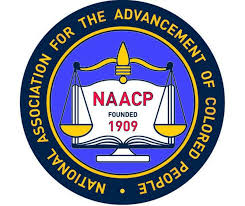 Later, McGann also showed second thoughts on her interpretation of the NAACP/DC call. During her presentation to the council, she implied that the national office was behind her (“They said they were very sorry Ms. Williams would not support me.”) But on August 6 she wrote to The Zephyr, “The exact words were, ‘We are very sorry, but Jeanetta Williams is the spokes person for your area.’ Did they mean they were simply sorry because I wasn’t supported or were they sorry because they supported my position?”
Later, McGann also showed second thoughts on her interpretation of the NAACP/DC call. During her presentation to the council, she implied that the national office was behind her (“They said they were very sorry Ms. Williams would not support me.”) But on August 6 she wrote to The Zephyr, “The exact words were, ‘We are very sorry, but Jeanetta Williams is the spokes person for your area.’ Did they mean they were simply sorry because I wasn’t supported or were they sorry because they supported my position?”
Or were they just being polite?
I asked McGann for the name of the person she spoke to so I could clarify the matter, but she replied, “I didn’t write down numbers or names.”
On August 8, in another email exchange, McGann had second thoughts about her second thoughts. She wrote, “The manner she (the women from the national NAACP) said, ‘We are very sorry…’ left me feeling as though they or she at least agreed with me… If I hadn’t been confident in my vote I would have pressed her further. Because of the manner in which it was said, I do not feel the need to clarify my statement. Sense (sic) it was a non-recorded phone call it comes down to just my word.”
And McGann added, “I did not ask the women I spoke to what her position was or was she speaking for the NAACP or just herself. Initially I wasn’t planning to mention the phone call. I decided to after Ms. Tubbs told me the day before the vote she’d changed her mind.”
While McGann may find some ambiguity in the NAACP/DC’s phone call, there is nothing ambiguous about McGann’s opinion of Jeanetta Williams. I asked Councilwoman McGann if she felt Williams’ comments about affordable housing constituted the ‘personal attack’ she referred to in her presentation.
McGann wrote, “The comment on affordable housing was not what constituted a personal attack, it was the manner in which she spoke to me. It was aggressive, condescending and rude. Plus she never answered my question, which was, ‘If it is not offensive to some why did the US Army apologize, in November of 2014, for using the term Negro and have it removed from all their written materials?’”
 McGann’s reference to the US Army is about outdated language used in contemporary literature, and not about historical language used in a historical context. It shouldn’t have a bearing on this argument. And that finally is what I sought from Councilwoman McGann. I asked, “Do you think there is a difference between actually calling someone a Negro in 2015 and allowing a place name to stay the same because of its historical context? If you don’t think there’s a difference, can you tell me why?
McGann’s reference to the US Army is about outdated language used in contemporary literature, and not about historical language used in a historical context. It shouldn’t have a bearing on this argument. And that finally is what I sought from Councilwoman McGann. I asked, “Do you think there is a difference between actually calling someone a Negro in 2015 and allowing a place name to stay the same because of its historical context? If you don’t think there’s a difference, can you tell me why?
Here was her written reply:
“I started questioning the appropriateness of the name over ten years ago when a young third greater (sic) of African American descent told me the name made her sad because when they passed it on the school bus some of the boys would say, ‘There’s your canyon Negro.’ Then they would laugh. The name in its present form is offensive to some not all but enough to make the change. The name lost its historical content when Lady Bird Johnson had it changed from Nigger Bill to Negro Bill.”
In the end, McGann and her supporters insist there is no difference between calling someone a “Negro” in 2015 and referring to a canyon called “Negro Bill,” in memory of Moab’s earliest black resident, despite opposition from even the NAACP. County elections are next year and with four seats up for grabs, McGann hopes to prevail sooner or later.
But for what it’s worth, I pass along these few lines from an article I read recently by Greta Christina from The Humanist. She observed:
‘If we care about racism…there’s something we need to do. It’s enormously important. If any other action we take is going to be useful, we need to take this one. And sometimes, it can be really freaking difficult. We need to shut up and listen…And listening means not talking. It doesn’t mean jumping in with arguments about topics we know little about. It doesn’t mean waiting patiently until the other person has stopped talking, so we can say whatever we were going to say anyway.’
Listening…Something to consider, at least.
Jim Stiles is Founder and Co-Publisher of the Canyon Country Zephyr.

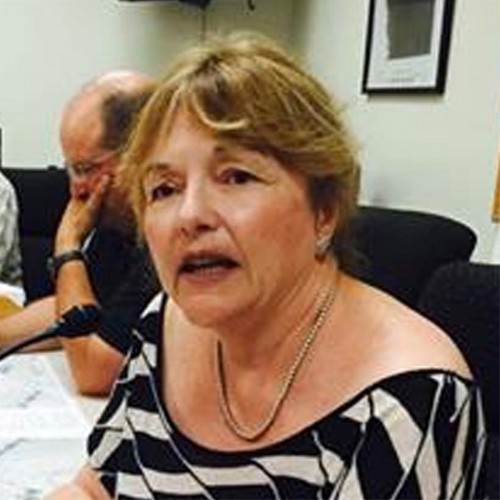
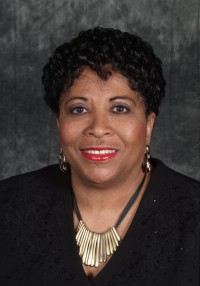
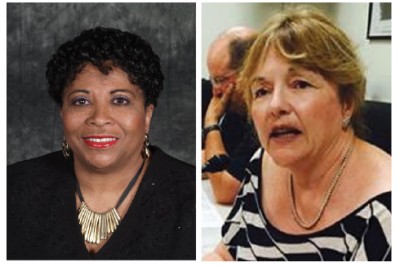
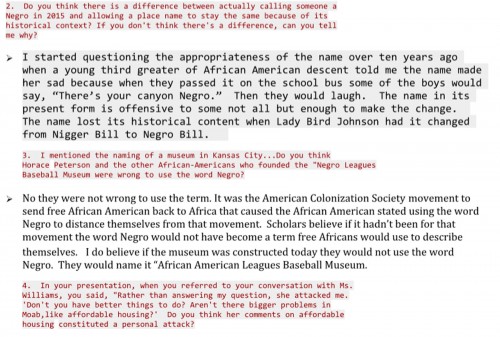
I very much enjoyed your interesting article.
Well done.
enjoyed the article very much.it shows that Mary is thinking shes above every one else I think there should be a recall on her because she obvious thinks nothing about votes count .it was decided that the name stays the same but she simply ignores it. keep up the good work Jim
Thank you for your article. I agree with Kent Green. Ms McCann needs to be replaced by someone who really cares about all the problems that need fixed instead of trying to make a name for herself by beating a dead horse.
Very good article.
What a classic case of political correctness gone amok. This is a historic name of a place and has no current racial overtones. The name, as given, was a reflection of its time. I’m an old hippy liberal and all I can say is lighten up and get over this business of EVERYTHING having to be politically correct. This is real life, not some ideal construct of what you think the world should look like. Sometimes I’m embarrassed to call myself a liberal!
The guy’s name was actually Nigger Bill. Just saying. Changing it to Negro Bill is racist. Changing it to William Granstaff Canyon is racist. When you do that it’s like holding up a sign that says: this guy was black, his name was Negro Bill, but it wasn’t. Nigger Bill is what he wanted to be called and maybe that is what should be printed on the sign, “Nigger Bill Canyon–Don’t let your panties rise into your crack–It is what he wanted to be called.” The name made him unique at the time–and he was tough as nails and it was a defiant embrace of his legacy. Take his color away from him or his context in history and that is racist, too. I think we need black people to decide this–just gather up the African Americans in town, have a discussion on Bill’s history in this area, and take a vote on any number of things you want to call the Canyon and that can be the history of this situation. The fact that African American people decided the name can be printed on the sign to give it some legitimacy. Political correctness will not change history and anyone who is white has no business changing a black man’s name just so we can look less racist. We live in a racist society. Nigger is a word with a historic past and an important story behind it and it is a word that can mean so many different things. My hip hop collection wouldn’t be the same without it–along with the word black people chose for white men: Motherfuckers. Just don’t use the N-word to describe a black person or load it up with anger and sling it like a dagger, or use it around black people if you ain’t black. Accept the fact that Nigger Bill was proud of his name because it set him aside from the honkies who rustled cattle and traded guns with the “Indians.” Anybody appreciate the fact we call the real “Americans” (another misnomer) Indians–a word that implies that they come from some place in the Far East? While we are changing things to be politically correct maybe we need to change that sign that says, “Indian Writing” to “Native American Facebook.”
I am white, and old enough to remember Little Rock, Birmingham, Selma, Medgar Evers, and the March on Washington, which I watched live. My mother’s family is from Birmingham, which provided a stark and uncomfortable contrast to the very integrated elementary school I attended in a university town. I am a long time supporter of the Southern Poverty Law Center and a member and former executive committee member of our local NAACP chapter. I say this not to burnish my credentials but rather to make the point that, as Lincoln said, “We cannot escape history.” This is all history I lived. And if history means that someone’s sensibilities are offended, that fact does not change history, and should not provide an excuse to erase it (as if that is even possible) Leave the name alone. It is history, a part of the legacy of slavery and racism that we refuse to fully acknowledge.
Back in 1992, we visited the Helper Railroad and Mining Museum, located in Helper, Utah about halfway between Salt Lake and Moab. At that time, it contained a fascinating project created by a local student about a 1924 coal mining disaster in a nearby town that killed 172 miners. It was prepared some years after the explosion. The student, as I recall, prepared a diagram of the mine that showed where each body was found, as well as a complete list of the countries of birth of each miner. The last two “nationalities” on the list, as I recall, were Negroes and Indians, and western European natives were listed before eastern and southern ones. This exhibit was interesting not only because it discussed in some detail how the disaster occurred and why everyone in the mine died, but also what status various ethnic groups had in Utah’s Carbon County at the time of the disaster. I would hope that this exhibit is still on display in Helper, just as I hope that Negro Bill Canyon keeps its name and continues to acknowledge the nature of the time in which it was named.
Keep the name. This is tempest in a teapot, and that tedious lady needs to leave her post, if stirring up pointless trouble is what she does best.
My family always referred to the canyon as ‘Nigger Bill’ without any negative connotations. My cousin and I decided from a very young age to call it ‘African American William.’ When I first heard there were talks of changing the name I was all for it. After several conversations and the articles written by you, Jim, I have changed my mind. It does get exhausting listening to white people talk about racism as if they are experts on the matter.
Martin Luther King Jr. used the word “Negro” in his famous “I Have a Dream” speech. Anyone offended? Shall we ask the media to blip it out?
“The heart of this argument is not whether the word “negro” should be used in daily conversation to describe African-Americans. Nobody is remotely suggesting that. The question is, or should be, is it proper to use the term, Negro,’ in its historical context?”
???
I was, and am, unaware that the word “negro” is offensive. Antiquated, to be sure, and not commonly used any longer, perhaps even quaint. But racist? After all it means “black” in Spanish, and black is the term we now use to describe those of a darker skin pigmentation. It makes me wonder why “African-American” shouldn’t also be relegated to the dustbin of history. After all, no one routinely refers to me as “German-American” although that would be as appropriate a description as “African-American” is for a dark-skinned citizen. Perhaps even referring to skin pigmentation should be banned so as not to offend anyone. And what about that most terrible of all racist authors, Mark Twain? Cast hm out to the farthest reaches of literary limbo? Never again to afflict the senses of delicate young students with his unregenerate, unapologetic use of the “N” word? Or require it be changed to “Negro”? Except that is now equally offensive-just as “Black” will also someday be. Alternatively, perhaps we could learn to take context into consideration and stop worrying about being completely and meekly inoffensive to all-an impossible task in any case.
In honor of ol’ Bill Grandstaff, I recommend that keep you the name “Negro Bill Canyon”. It both honors the history and Bill’s historical association with the location. I’ve been visiting Negro Bill Canyon on and off since my first visit in 1985. Just because an African-American third-grader received a stupid comment as their bus passed by the sign for the canyon is no reason to get rid of the name or the sign. Children are often cruel to one another and the worst of the lot will ways to humiliate each and everyone around them. As a child, you can be humiliated for being fat, skinny, beautiful, ugly, tall, short, nerdy, Jewish, Catholic, Muslim, short hair, long hair, whatever, you name it. Children will find what makes you different and focus on that. If you happen to be African-American, black-ness is the thing that sets you apart from the majority. Racist childish commentary should, of course, be treated seriously. I suppose if left unattended, such commentary may be an indication that the individual is a budding racist, but that is not a given. The comment is likely nothing more than a kid saying something stupid. Who amongst us has never ever said something stupid in our lives?
Let me share a couple of letters to the editor in the TI yesterday from Pat and Kevin McGann, Councilwoman McGanns brother-in-laws, since the TI does not go electronic until next week. These are word for word out of the paper.
Justified?
The Grand County Council members that voted against changing the name of Negro Bill Canyon on Tuesday, Aug.4 all deferred to Negro Jeanetta Williams as the justification for their vote.
Ms. Williams, the Negro representing the NAACP of Utah, said, “Changing the name to Granstaff would take away all of the history”.
She would support the installation of a historical marker in Granstaff’s honor. “If they want to do that, that would be acceptable, but not the name change. We encourage the history to be told”, the Negro Williams said.
Pat McGann
Ignoring the majority….
I was pleased to read the Bureau of Land Management has taken up my” suggestion for an interpretive plaque/historical marker at the Negro Bill Canyon trailhead: disappointed to learn the Council voted down the Negro Bill name change resolution.
No matter, the young woman quoted in the TI story, Kayla Weston, put it correctly and eloquently: “I’m sorry NAACP, but I speak for a younger generation, one for whom polite substitutions for name borne of hate no longer works”.
This issue will not go away; the name will be changed. The no-voters on the Council apparently used the now infamous Washington Redskins logic: “Well hey, we found some certain tribal officials – somewhere – who did not object, so we’re stickin’ with Redskins.” Or in our case, council members said, “Well hey, we found a vague and distant African American ‘officialdom’ who did not object, so we’re stickin’ with Negro Bill.
Two Council members said their votes could change in the future.. like swinging doors, based on changes in yon distant African American official’s position. Amazing!
Really, I’d like to know how many Grand County citizens ever heard of the Tri-state NAACP before this business came up? And yet the NAACP seems to have the council wrapped around it’s finger. Never let it be said the right-leaning members of our council aren’t PC….yeah, when it suits them.
Again, we see this council giving more weight to outside opinions, just as it ignores the wishes of a solid majority of local citizens.
Reminds me of the recent Eastern Utah Seven County Coalition debacle. We know how that turned out. In the end, it will be the same with the N-word Bill.
Kevin McGann
Seems to be a typical reaction from progressive’s, they’re all about collaboration and working togather until they don’t get their way. Then they get pretty vicious. I am appalled by these letters and can’t believe the TI would print the one from Pat…..
.
…
logically, for historical accuracy, it should be called “nigger” bill grandstaff canyon”. especially if that was what this historical grand county person was really called and was what he himself used.
by all accounts he was a pioneer and a good one at that and by owning the name he pointed out with perfect irony that, because of the way in which he lived and was respected, that the epithet, “nigger”, was just that, a racist stereotype that his own real and good life gave the lie to.
adding his last name gives him his individuality as a real person.
listen to the african american woman from salt lake city.
“Nigger Bill”, as he preferred to be called, just rolls off the tongue easier than anything else brought forward. We will be the poorer for its loss, and for the loss of this man’s memory, and that of his real life and times. KneeGrowBill just doesn’t cut it. And Granstaff or Grandstaff are misnomers that scrub the memory of the man from history. Those are as bad as renaming the canyon “Forty Two”, though a name like that might be used to commemorate Douglas Adams.
A name should have some meaning, and if we are going to do the man real honor we should put aside our silliness and allow the man to be called by his preferred and chosen name.
I realize that in October of 2017 I am a little late to the party. Perhaps one day we can forget about the foolish wringing of hankies and the trembling china teacups, and remember a man for who and what he was.
As for the “re-namers”, perhaps one day they will be remembered as Sweet Old Broads.
a bunch of old-ass white people arguing about what a black man in the past preferred to be called. changing the name won’t erase the history of the place. do you think a tourist family from florida is going to drive by a sign that says ‘negro bill’ and think, “hmm, guess we’ll reconsider our thoughts about race now”…?
arguing passionately to save a name that many locals KNOW is only one step away from a serious racial slur is the wrong hill to die on, folks. if you really care about the history of this man, build him a damn statue in town.